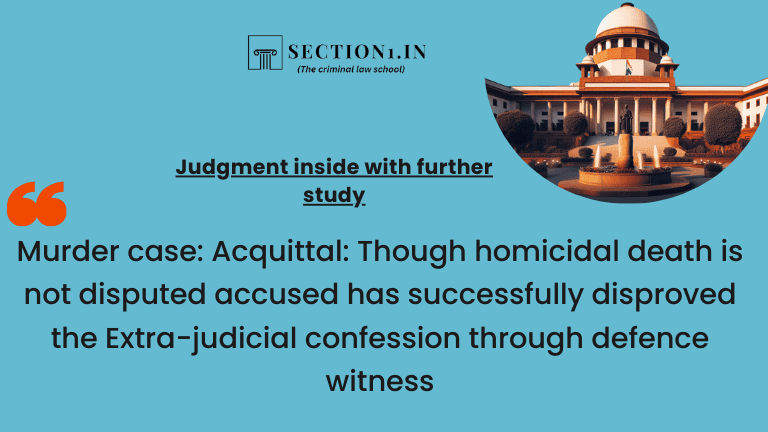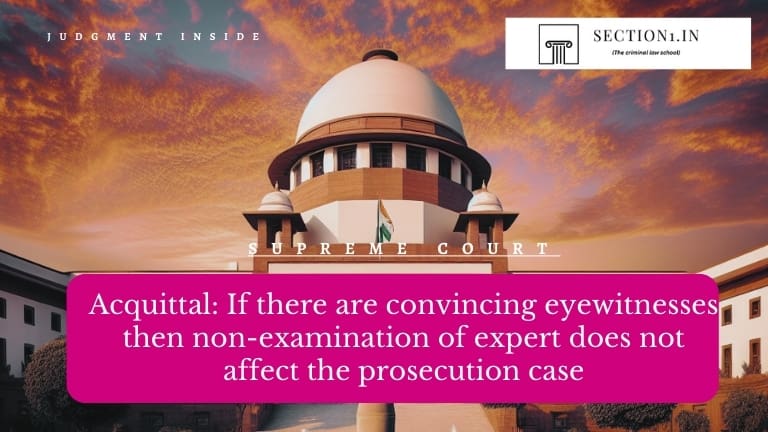APPEAL
1. The appellant was convicted for the offences punishable under Sections 302 and 201 of the Indian Penal Code (for short, ‘IPC’). He was sentenced to undergo life imprisonment for the offence punishable under Section 302 and rigorous imprisonment for seven years for the offence punishable under Section 201, IPC. Sentences were ordered to run concurrently. The appeal preferred by the appellant has been dismissed by the High Court by the impugned judgment.
PROSECUTION RELIED EXTRA-JUDICIAL CONFESSION
3. The prosecution relied upon the extrajudicial confession made by the appellant before PW1 Ganesan Perumal in the presence of PW2 Tyagarajan Kannan. Secondly, the prosecution relied upon the recovery of the dead body and the stick allegedly used as a weapon of assault at the instance of the appellant. Thirdly, according to the prosecution, the skeleton was identified by PW nos.3 and 4 on the basis of the clothes thereon.
OUR VIEW
6. Firstly, we will deal with the prosecution case about the extrajudicial confession. As regards extrajudicial confession, the law has been laid down by this Court in the case of Pawan Kumar Chourasia v. State of Bihar. In paragraph 5 it is held thus:
“5. As far as extrajudicial confession is concerned, the law is well settled. Generally, it is a weak piece of evidence. However, a conviction can be sustained on the basis of extrajudicial confession provided that the confession is proved to be voluntary and truthful. It should be free of any inducement. The evidentiary value of such confession also depends on the person to whom it is made. Going by the natural course of human conduct, normally, a person would confide about a crime committed by him only with such a person in whom he has implicit faith. Normally, a person would not make a confession to someone who is totally a stranger to him. Moreover, the Court has to be satisfied with the reliability of the confession keeping in view the circumstances in which it is made. As a matter of rule, corroboration is not required. However, if an extrajudicial confession is corroborated by other evidence on record, it acquires more credibility”. (emphasis added)… [pawan kumar supreme court judgment file]
FACTS OF EXTRAJUDICIAL CONFESSION
7. We have perused the evidence of PW1 Ganesan who was posted as the Village Administrative Officer at the time of the commission of the offence. He was not permanently posted in Village Seekkarajapuram as he stated that at the time of recording of evidence, he was transferred as Village Administrative Officer to Ranipet. PW1 admitted in the cross examination that he did not know the appellant before he came to him and allegedly made the extrajudicial confession. The incident is of 29th May 2006 but the alleged extrajudicial confession was made on 10th August 2006. It is impossible to understand why would the appellant meet the Village Administrative Officer, who was a total stranger to him, more than two months after the incident for making a confession. PW1 and the appellant were not known to each other till 10th of August 2006. Normally an accused will confide only with a person in whom he has implicit faith. He would not go to a stranger to make a confession of guilt. The fact that the alleged confession was made by him more than two months after the incident makes it more suspicious.
TAKING THUMB IMPRESSION IN CONFESSION – NOT PROVED
8. PW1 claims that he recorded the statement of the appellant and took a thumb impression of the appellant. There is no evidence adduced by the prosecution to prove the thumb impression. PW1 claims that after making the confession, the appellant took him to the place of the incident which is located near the railway overbridge on the bank of the river Ponnai. PW1 did not take the appellant to the police station after the alleged confession was made. He admittedly did not inform the police immediately after recording the alleged Extrajudicial confession. PW1 claims that he visited the place of incident with the appellant who showed him the scene of the alleged offence. Only thereafter he took the appellant to the police. It is also pertinent to note that in his cross-examination, PW1 admitted that there were 67 huts near the place of residence of the appellant and the families residing therein belonged to the same caste as that of the appellant. Thus, there were people around before whom the appellant could have confessed.
APPRECIATION OF EXTRAJUDICIAL CONFESSION
10. Extrajudicial confession is always a weak piece of evidence and in this case, for the reasons which we have recorded earlier, there is serious doubt about the genuineness of the prosecution case regarding the extrajudicial confession. Therefore, the prosecution case about the extrajudicial confession does not deserve acceptance.
15. Though the respondent tried to rely upon the evidence of PW8 who has been declared hostile, we find that he had made a general statement that he had seen the appellant and deceased together two years back. Moreover, the other witnesses examined to prove the last seen together theory were declared hostile. Thus, the prosecution could not establish the last seen together theory.
16. There is serious doubt about the genuineness of the prosecution case regarding the recovery of a dead body at the instance of the appellant and the recovery of the alleged instrument of the offence at the instance of the appellant. Most importantly, for the reasons we have recorded earlier, it is not possible to accept the case of the prosecution which is entirely based on the extrajudicial confession made by the appellant. Thus, there was no legal evidence on record to convict the appellant. In any case, the guilt of the appellant has not been proved beyond a reasonable doubt.
Accused acquitted.
PARTY: Moorthy vs State of Tamil Nadu – CRIMINAL APPEAL NO.975 of 2011 – August 18, 2023.
https://main.sci.gov.in/supremecourt/2010/38629/38629_2010_11_1501_46243_Judgement_18-Aug-2023.pdf






